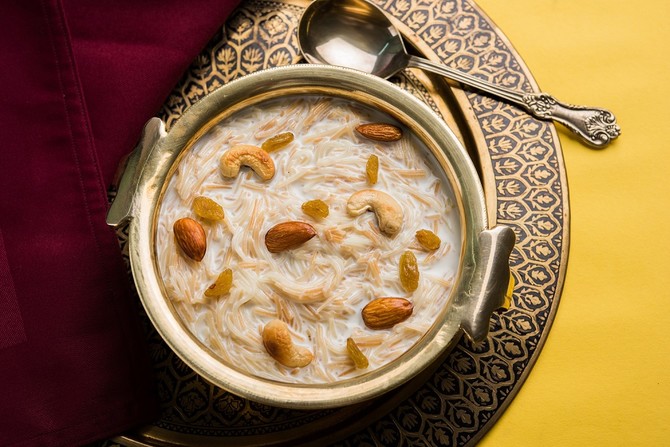As Ramadan comes to an end, Muslims across the world will celebrate Eid Al-Fitr with a host of traditional sweet treats.
Eid biscuits
An essential during the “Sweet Eid” celebrations that most Arabs in Palestine, Syria, Jordan and Lebanon prepare, Eid cookies are baked in a variety of styles. Palestinians bake a form called graybeh, stuffed with either pine nuts or almonds. In Syria and Lebanon, a form of Eid biscuits is made stuffed with dates or walnuts. The same Eid biscuit are known in Iraq as klaicha.
In Egypt, they are known as kahk — the delicate exterior is powdered with sugar, while common fillings include walnuts or even nothing at all.
Sevia
The traditional warm, sweet vermicelli milk known as sevia (pronounced “sev-ay-a”) is popular during Eid in countries such as India, Pakistan and Bangladesh. The treat is made of vermicelli noodles in a dish of boiled, sweetened milk spiced with cardamom and saffron before chopped up dates or pistachios are added for texture.
Aseeda
This jelly dessert known as aseeda is made up of a cooked wheat flour lump of dough. It is enjoyed in Yemen, Saudi Arabia, the UAE, Sudan and Libya. It is primarily made from wheat and honey and is on served during religious festivities.
Laasida
Moroccans start off their Eid celebrations with a sweet dish called laasida. It is similar to rice pudding, but consists of couscous, butter, honey and seasoning.
Debyazah
A traditional sweet dish that forms an essential part of the Eid breakfast in Saudi Arabia. Cooking debyazah can begin up to three days before Eid. The sweet dish is made of fresh nuts, including almonds, pistachios and pine nuts. Dried fruits are also added, including figs, apricots, dates and raisins.
Baklava
This crunchy dessert is loved across the Arab world and is made of layers of filo pastry laced with butter and chopped pistachios mixed with other nuts. The pastries are soaked in a rose flavored sugar syrup and offered up on tables across the Middle East, if not the world.














